|
|
|
Sort Order |
|
|
|
Items / Page
|
|
|
|
|
|
|
| Srl | Item |
| 1 |
ID:
153683
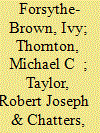

|
|
|
|
|
| Summary/Abstract |
African American and Black Caribbean relations dominate research on interactions across black ethnic divides. Using National Survey of American Life data, we explore a different aspect of black interethnic attitudes: how close these groups feel towards Africans. African Americans and Black Caribbeans were largely similar in their feelings of closeness to Africans. For Black Caribbeans, younger and male respondents, those reporting higher levels of financial strain, living in the northeast and persons who immigrated to the US at least 11 years ago, report feeling especially close to Africans. Being male was the only significant correlate among African Americans. The findings are discussed in relation to how race, ethnicity and national origin shape personal identities within the US and their significance for intergroup perceptions. These broader issues warrant further consideration in light of assertions that race as a defining feature of American life and intergroup relations is obsolete.
|
|
|
|
|
|
|
|
|
|
|
|
|
|
|
|
| 2 |
ID:
153679
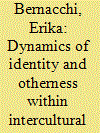

|
|
|
|
|
| Summary/Abstract |
Drawing on fieldwork carried out in 2012–2013, this article explores the dynamics of identity and otherness within selected women’s intercultural associations in Italy in the light of the following issue: how to acknowledge differences among women – based primarily on ‘race’, ethnicity, legal status/citizenship, class and age – while maintaining a common political project. This article focuses on the contexts, which facilitate the formation of such a project by promoting the contesting of rigid categorization of women on grounds of nationality or culture. It first focuses on what is referred to as ‘a starting point a bit displaced’, second on the desire to move beyond divisions on nationality grounds and third on the concept of hybridity as a bridge between women. At the same time, the article confronts those issues that might conceal power differentials among women and argues in favour of a notion of feminist intercultural reflexivity.
|
|
|
|
|
|
|
|
|
|
|
|
|
|
|
|
| 3 |
ID:
153676
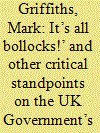

|
|
|
|
|
| Summary/Abstract |
The UK Government’s International Citizen Service (ICS) sends volunteers abroad to ‘fight global poverty’ as ‘global citizens’. Perhaps unsurprisingly, the construction of development on the ICS programme forecloses important political and historical contexts, resulting in a model of global citizenship we might term ‘soft’. This article presents data from interviews with ICS volunteers with a specific methodological concern of recognizing the agency of young people and allowing their responses to lead discussion. The outcome is a range of themes across the data that critique the Government’s model of citizenship and, I argue, shows the volunteers to be ‘critical’ global citizens. I then ask whether we can consider this a mode of resistance. I conclude with a final data set that – the case is made – presents an imperative to allow these volunteers to have their perspectives on historical and contemporary North–South relations recognized as a critical mode of global citizenship.
|
|
|
|
|
|
|
|
|
|
|
|
|
|
|
|
| 4 |
ID:
153681
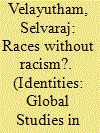

|
|
|
|
|
| Summary/Abstract |
In Singapore, race has a prominent place in the city state’s national policies. Its political ideology of multiracialism proclaims racial equality and protection for minority groups from racial discrimination. However, despite official rhetoric and policies aimed at managing and integrating the different ethnic groups, some scholars have argued that institutional racism does exist in Singapore. While it is public knowledge, with few exceptions, racist provocations and experiences of racism are not publicly discussed. In recent years, the advent of social media has made it possible for Singaporeans oftentimes unwittingly to express racially derogatory remarks. This has highlighted that racism is much more deep rooted. Yet, it still remains the white elephant in the room. This paper examines the sociopolitical context that has contributed to everyday racial discrimination and calls for a public acknowledgement of racism so as to combat racist practices.
|
|
|
|
|
|
|
|
|
|
|
|
|
|
|
|
| 5 |
ID:
153682
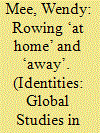

|
|
|
|
|
| Summary/Abstract |
This paper is grounded in a comparison of the cultural identifications that accompany Sambas Malays’ participation in rowing competitions ‘at home’ and ‘away’. Sambas Malays are Indonesian citizens from the regency of Sambas, who ethnically identify as Malay. There, rowing competitions provide the sociocultural infrastructure for developing local and translocal cultural identifications. Two related, yet distinguishable, cultural identifications are evident, each associated with a specific rowing infrastructure. When contests occur ‘at home’, rowing is steeped in local Sambas Malay culture and heritage. However, contests ‘away’, in areas loosely identified as ‘Malay’, generate identifications with a regionally based Malay culture and consociality. Utilizing a non-positivistic conceptualization of ‘border’, this paper considers the intersection of culture, politics, economy, geography and mobility in everyday bordering practices producing two overlapping cultural identifications.
|
|
|
|
|
|
|
|
|
|
|
|
|
|
|
|
| 6 |
ID:
153678
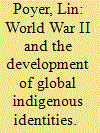

|
|
|
|
|
| Summary/Abstract |
The indigenous rights movement emerged in the last quarter of the twentieth century, establishing a newly conceptualized identity claimed not on the grounds of shared culture, language or ancestry but on shared experience as native peoples marginalized by colonial expansion. This article examines how the Second World War created conditions favouring the emergence of indigenous identity as a global concept. Using a comparative perspective, this paper considers two ways in which war conditions affected indigenous peoples: by highlighting issues of citizenship, loyalty and military service; and by altering how combatant powers evaluated indigenous cultures. While the experiences of particular groups varied widely, the wartime era focused attention on both policies of assimilation and assertions of distinctiveness, creating a fluid context for change. A global, comparative perspective offers insight into the role of the war era in understanding the relationship between indigenous activism and the international order.
|
|
|
|
|
|
|
|
|
|
|
|
|
|
|
|
| 7 |
ID:
153675
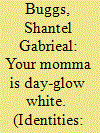

|
|
|
|
|
| Summary/Abstract |
This article utilizes discourse analysis and an auto-ethnographic approach to explore the impact of US racial and ethnic categorization on the experiences of an individual marked as ‘mixed-race’ in terms of individual identity and familial/cultural group loyalty and obligation(s). This essay focuses on an incidence of public policing through the popular social networking platform Facebook, centring on the invocation of racial obligation by white friends and family members. I analyse how racial loyalty is articulated by friends and family members in their posts on my personal Facebook page and how this ‘loyalty’ is used as means of regulating my mixed-race identity performance. This essay aims to understand several things, namely how identity is mediated through the invocation of racial obligation and how tension around identity plays out in the multiracial family.
|
|
|
|
|
|
|
|
|
|
|
|
|
|
|
|
|
|
|
|
|